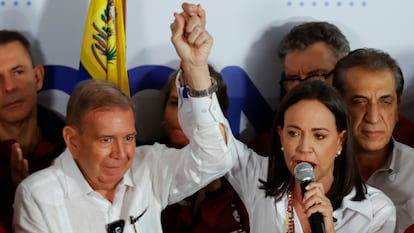Verification in Venezuela
The Maduro government must heed the calls of the international community and allow an impartial vote count following the presidential election on Sunday

Venezuela held crucial elections on Sunday, in which for the first time in more than a decade the Chavistas faced off against the opposition. The result of the vote, however, left a series of questions that must be cleared up without delay. The National Electoral Council (CNE), under the majority control of magistrates with close ties to the government, declared Nicolás Maduro the winner over his main rival, the diplomat Edmundo González Urrutia. The president, according to preliminary data, obtained 51.2% of the votes and a seven-point lead over his main rival. The opposition, led by María Corina Machado, rejected these figures without any hesitation and denounced irregularities in the vote count.
The opposition coalition says that it has managed access to 73% of the paper tallies from voting stations. Machado and Urrutia maintain that the percentage of votes that their station observers were able to verify reflects a trend that would seem to give them a crushing victory. The elections in which the continuity of 25 years of Chavismo was at stake have thus led to a new political face-off. The lack of transparency in the electoral process has not only set off alarm bells in Venezuela, but also activated the international community over suspicion of fraud.
The United Nations, the European Union, the United States, Spain, the Carter Center — authorized by the Chavista government as an observer — and the vast majority of Latin American countries, including the progressive governments of Lula da Silva (Brazil), Gustavo Petro (Colombia) and Gabriel Boric (Chile), are all making the same demand. That is to say, if Maduro wants to legitimize his reelection, he must release vote tabulations and allow impartial observers to confirm them. These questions have solid foundations. Chavismo has eroded its own credibility as a political interlocutor and, even before these elections, it had already become clear that it does not even care about maintaining a certain democratic decorum. Officials demonstrated this by preventing broad international observation: they vetoed the European Union mission, blocked the entry of former Latin American presidents, expelled the opposition’s guests, and refused to give credentials to reporters.
In order for the outcome of the presidential elections announced by the CNE to be credible, the Venezuelan government must allow the voting records to be accessed. At the same time, the opposition has the obligation to support and prove its accusations, for instance by publishing the documents in its possession. The campaign team of González Urrutia agreed to participate in the vote, abiding by adverse rules of the game. The first sign was the disqualification of Machado herself, who was unable to run as a candidate and was forced to back a substitute. Added to this was the persecution and arrest of collaborators and advisers to the campaign, with dozens of detentions. To all this we must add an extremely serious fact: the obstacles that the Chavista apparatus, which controls all the levers of the State, created to hinder voting from abroad. Of the nearly five million Venezuelans with the right to vote who left the country as a consequence of the social and economic crisis, only 69,000 were able to register to exercise their right. The CNE set a period of just 30 days — much more limited than in previous presidential elections — and demanded a series of bureaucratic requirements that were often insurmountable for an immigrant.
Given these premises, it is crucial for the government of Nicolás Maduro to agree to disclose all the records. In the meantime, it is vital that both parties act responsibly and, in a scenario of massive mobilizations, commit to guaranteeing the right to protest while avoiding violence. The Venezuelan people voted peacefully and deserve a transparent and rigorous vote count.
Sign up for our weekly newsletter to get more English-language news coverage from EL PAÍS USA Edition
Tu suscripción se está usando en otro dispositivo
¿Quieres añadir otro usuario a tu suscripción?
Si continúas leyendo en este dispositivo, no se podrá leer en el otro.
FlechaTu suscripción se está usando en otro dispositivo y solo puedes acceder a EL PAÍS desde un dispositivo a la vez.
Si quieres compartir tu cuenta, cambia tu suscripción a la modalidad Premium, así podrás añadir otro usuario. Cada uno accederá con su propia cuenta de email, lo que os permitirá personalizar vuestra experiencia en EL PAÍS.
¿Tienes una suscripción de empresa? Accede aquí para contratar más cuentas.
En el caso de no saber quién está usando tu cuenta, te recomendamos cambiar tu contraseña aquí.
Si decides continuar compartiendo tu cuenta, este mensaje se mostrará en tu dispositivo y en el de la otra persona que está usando tu cuenta de forma indefinida, afectando a tu experiencia de lectura. Puedes consultar aquí los términos y condiciones de la suscripción digital.









































